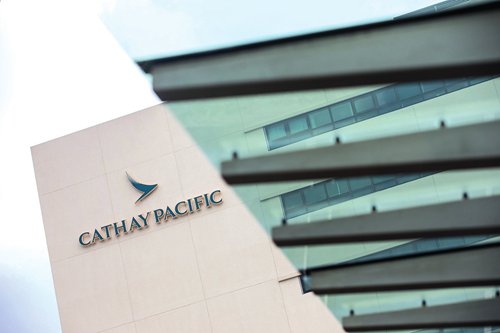HOME >> BUSINESS,SPECIAL-COVERAGE
HK aviation sector risks losing passengers if it indulges protesters
By Wang Yi in Beijing and Fu Guohao in Hong Kong Source:Global Times Published: 2019/8/6 21:48:40

The Cathay Pacific Airways Ltd logo is displayed atop a building at Cathay Pacific City, the company's headquarters, in Hong Kong in August, 2018. Photo:VCG
Hong Kong's aviation industry risks losing its passengers to adjacent regions if they don't quickly make their stance clear and continue to indulge protesters who wantonly obstruct their normal operations, according to analysts.
If occasional short-term chaos and breakdowns caused by the unrest turn into an ongoing problem, Asia's busiest airport will be abandoned by passengers and lose its status, an industry insider said.
Amid a general strike in Hong Kong, about 250 passenger flights were cancelled by local airlines at the Hong Kong International Airport on Monday after the transport hub became the latest target of protestors, according to media reports.
Although the Airport Authority Hong Kong (AA) posted a notice on Sunday, saying that anyone should follow rules and not affect airport operation and others who are using the airport, the protest severely disrupted the airport's normal operations and caused great inconvenience to passengers.
As opposition forces occupied a passageway, there was only a narrow path left for passengers, a Global Times reporter at the scene found on Monday.
Local airlines that permit staff to strike and hold an ambiguous stance toward the civil unrest that has caused social disorder and economic loss have drawn public criticism.
A Cathay Pacific pilot who was arrested on July 28 during the unrest was still being allowed to fly, which caused great security concerns among the public.
Lam Chi-ting, general secretary of the Hong Kong Tourism Industry Employees General Union, told the Global Times that allowing a pilot who has been accused of rioting to go back to cockpit will cause "great unease and concerns."
"The pilot participated in unrest without police permission, which shows he lacks a sense of judgment, but a pilot needs good judgment," Lam said.
Letting a pilot with extreme thoughts fly a plane is like giving him a "big weapon," Lam said. "We all remember the 9/11 attacks, right?"
Its staff, contacted via telephone numbers and email addresses shown on the company's website, repeatedly told the Global Times that they are not in charge of responding to media enquiries and suggested that the Global Times ask the media or PR department.
The situation has been repeated three times within a month.
Cathay Pacific's PR department declined to comment when approached by the Global Times.
Qi Qi, an independent market watcher, said if airports and airlines continue to indulge protesters, the local aviation industry is at great risk. "Once disorder becomes entrenched, consumers will definitely choose alternative airports."
"Once disorder becomes entrenched, consumers will definitely choose alternative airports," Qi said. "The most direct impact will show up in employment."
In 2018, passenger throughput at South China's Shenzhen Bao'an Airport rose 8.2 percent, and the growth rate at Guangzhou Baiyun Airport was 5.9 percent -- both higher than the 2 percent growth rate of Hong Kong Airport.
If disruptions by protesters worsen in Hong Kong's aviation industry, competitors could easily fill any gaps, Qi said.